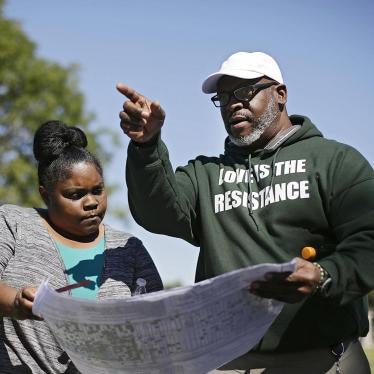Next year will mark the 100th anniversary of the Tulsa Race Massacre, one of the worst acts of state-sanctioned violence against Black people in United States history.
After years of fighting for justice, massacre survivors and descendants of survivors and victims are finally getting some long-delayed acknowledgment of the crimes committed that day. The legacy of those harms is still felt by Tulsa’s Black community today.
In early July, a historic resolution was introduced in both chambers of the US Congress “recognizing the forthcoming centennial of the 1921 Tulsa Race Massacre,” honoring the many victims of the attacks and condemning “past and present efforts to cover up the truth.”
The resolution, which has been introduced in both the Senate and the House but has yet to come to a vote, is the first ever in the Senate acknowledging the historical significance of the Tulsa massacre. The Tulsa Historical Society and Museum, the NAACP, and Human Rights Watch supported the resolution, which was heavily informed by a recent Human Rights Watch report on reparations for the massacre, as well as broader harms stemming from the legacy of slavery.
On May 31 and spilling into June 1, 1921, a white mob descended on Greenwood, a successful Black economic hub in Tulsa, Oklahoma then-known as “Black Wall Street,” and burned it to the ground. Some members of the mob had been deputized and armed by city officials. The mob destroyed 35 square blocks of Greenwood. The American Red Cross estimated the death toll was around 300, but the exact number remains unknown. The massacre’s devastating toll can never be fully repaired.
The resolution draws a clear line from the Tulsa Massacre to the ongoing struggles of Black people in the United States today, by condemning “the continued legacy of racism, including systemic racism, and White supremacy against Black people in the United States, particularly in the form of police brutality.”
Massacre survivors and descendants of victims have been stymied in their efforts to get compensation through the courts due to rulings saying the statute of limitations to pursue civil action has expired. But governments can and should develop reparation schemes, including compensation for survivors and victims’ descendants, without a court ruling. The congressional resolution is one step in what we hope will be growing momentum toward meaningful justice and compensation for the massacre.
That may also include efforts to revive a version of HR 98, the John Hope Franklin Tulsa-Greenwood Race Riot Claims Accountability Act of 2013, which would remove legal barriers at the federal level for Tulsa massacre survivors and descendants to pursue their civil legal claims.









